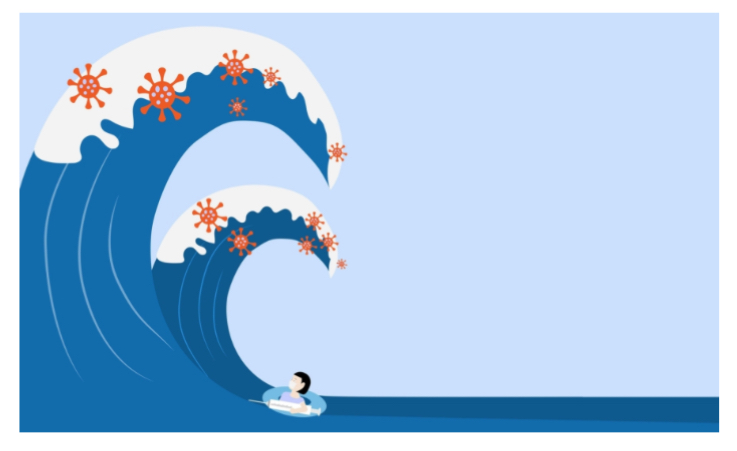After five full summers among us, COVID-19 has settled in once again and become, well, a FLiRT. That amusing technical acronym is the name given to the latest variants, which now account for more than 75% of the new COVID-19 cases in the United States. There’s consistently been a bit of a seasonal uptick in summer and winter, kind of like our property taxes.
For the last year or so, it’s the same symptoms but different variants, yet still COVID-19. Called FLiRT due to the technical names for its spike protein mutations, which include the letters F, L, R and T, FLiRT is a subvariant of last winter’s dominant strain Omicron, and is driving this summer’s COVID wave.
Best to ask Mr. Googly for any further explanation. Way above my expertise, as you may have guessed.
Unlike some of Michigan’s post-Labor Day temperatures, the virus continues to rise and pack a potent punch. Experts know this because of high levels of coronavirus found in wastewater in 44 states and the District of Columbia, according to the U.S. Centers for Disease Control and Prevention. Unfortunately, COVID wastewater levels are “likely growing” in several states, including Michigan.
No kidding.
About a week into our first getaway of the summer over Labor Day, I started feeling like crap. Sore throat, cough, cold, headache, chills. Shit shit double shit.
We’d been around more people in seven days than we had since last Christmas, but it hadn’t occurred to me that this was anything more than a summer cold or some kind of 24-hour bug.
To be safe, and because that tiny voice in my gut I aways listen to told me so, we drove to nearby Holland Urgent Care. Sure enough, my symptoms tracked, and the COVID-19 test was positive.
I felt terrible, not so much for me, but also for Rebecca and our host, Bonnie, a woman of a certain age who doesn’t need to be around sick people. Not that anyone does.
Urgent Care took us right away, checked my symptoms and said I had a fever of 100. The doctor swabbed my nostrils well into Michigan’s Upper Peninsula for a COVID-19 test. Exactly 23 minutes later, she confirmed it was indeed COVID-19, adding that I should isolate for three to five days or until I felt better, and then wear a mask in public or when around others indoors.
Me: “Will I need a prescription for Paxlovid?”
Her: “Nope. Not necessary.”
Me: “Should we tell everyone I’ve been in contact with?”
Her: “If you want to.”
Me: “Excuse me? If I want to?”
Her: “COVID guidelines are much different now. It’s been five years. We treat it like the common cold.”
Rebecca: “Huh? I’m missing some football for this.”
What a difference five summers makes, eh?
In a spring Gallup poll, about 59% of respondents said they believed the pandemic was “over” in the United States. Also, the proportion of people who said they were concerned about catching COVID-19 has been generally declining for two years.
Even the CDC has changed its guidelines for 2024: Stay home and away from others, but there’s no official timeline for how long. Wear a mask when you’re around others indoors. Use caution up to five days after you begin to feel better.
Long gone are masking requirements, social distancing and building closures. A very good thing, obviously. No more lengthy quarantines, wiping down groceries or airing out snail mail in your garage.
Instead, we have chosen personal responsibility and the honor system to show consideration and do right by our fellow citizens.
Remember how well that worked during the pandemic?
Though honestly, I still wouldn’t hug me now.
Thank goodness for scientific progress and less deadly strains, but I remain skeptical. Treating COVID-19 as a common cold seems unscientific and oversimplistic. I mean, the common cold doesn’t kill you or land you in the hospital on a ventilator.
What the heck do I know? I’m the fool who’s infected.
No point in tempting fate with this once insidious, deadly virus that took the lives of more than a million Americans, including a few people we knew personally. Tragic. God rest their souls.
Rebecca and Bonnie contacted most everyone we had seen since our arrival, including some new friends who will likely lose our numbers after this news. Alerting them seemed like the least we could do — common cold or not — and the right thing to do.
I’ll reserve moral judgment about those who make other choices. A little inconvenience is not a tragedy.
Per no doctor’s orders, I kept my bad infected self sequestered in the rental’s lovely guest room to prevent any further spread of my cooties. So far, so good.
It’s Sunday, and I can honestly say I’m on the mend. I was feeling almost human, enough to sit on the porch to get some Vitamin D sunshine and inhale west Michigan fresh air. Oh, and watch the Detroit Lions defeat those LA Rams 26-20 in overtime.
On Monday morning, we packed up the Beast RV and drove 200 miles home with me as Reb’s lone, masked-up passenger. I slept most of the way.
There’s a part of me that can’t help but think “if you want to” has become the new “don’t ask, don’t tell.” I can still remember seeing those refrigerated morgue trucks all over the news in 2020. Unimaginable even now.
Because of the lives lost and those forever changed from the pandemic, I’m absolutely certain I’ll always tell you if I test positive for COVID-19 — and you won’t even have to ask.
Time to reorder some masks. Maybe lavender ones.






18 Comments
Julie Sayers
You are most definitely doing the responsible thing by informing people! My brother died from sepsis COVID exactly a year ago. It can still be deadly. I am glad you are doing better. Hoping Rebecca is going to be OK also.
Jennifer John
I’m so sorry, Julie. My heart goes out to you.
Martha Miller
Was the doc looking for Lake Superior through your nostrils? Thank you for your service.
Jennifer John
Pictured Rocks! You’re welcome, MM.
Verna Smith
Sorry to hear you had COVID, Jen. I just got all my shots the other day. When you get my age, they keep adding more. COVID, RSV, flu. I hope not anymore next year. I’m running out of arm space. Feel better soon, and tell Rebecca we send our love. Miss seeing both of you. Verna and David
Jennifer John
Thanks so much. We’re going to plan a play date!
Richard Frederick Leighton
Hi, ladies. So sorry to hear that you got COVID. People seem to be so indifferent nowadays! It’s crazy! We try to be careful to stay away from crowds due to Tim’s many health issues, as well as mine, too. I had headaches for over 2 years, and am just these last 3 months noticing that their re-occurances have dissipated greatly! It has been very disturbing, and I didn’t know if they would ever end! Hope you are feeling better now. Take care, and be well! We head back to Florida on Nov. 2. It will be time by then as the Tundra Season will have already begun!
Jennifer John
So great to hear from you!
Elaine
So sorry to hear this Jen, and hoping Rebecca didn’t come down with it. But yes, I totally 100% agree with you about informing others, certainly the right thing to do. Just another thing about you that makes you so special! Love to you and Reb.
Jennifer John
Thanks, E.
Emily Everett
I’m confused by the notion that you should isolate but not notify people you exposed. Sounds contradictory to me!
Hope you’re getting better.
Jennifer John
I know, right? Strange indeed.
Elyse Rook
Hey, kiddo. I came back from a week in Vegas last month. After being around about 2 bazillion people in 103-degree heat. Upon my return home, I was so sick. Took two tests for COVID, both negative. But I know it was COVID. Took the prescribed some 20 pills, and it was gone. How did we get so lucky? All better now. Come visit this winter.
Jennifer John
Oh my! Thanks, my friend.
Mikolas Sharon
So sorry to hear you’ve been sick, glad you’re on the mend, shocking though how all those poor people died from it, and now they’re treating it like the common cold? Hope to see you sometime soon. Stay well.
Jennifer John
See you soon, too. Thanks, SM.
Lenore Leah Devlin
Sorry to hear. But telling is honorable, and you certainly are that. Hope you are on the mend.
Jennifer John
Thanks, LD. Miss seeing you.